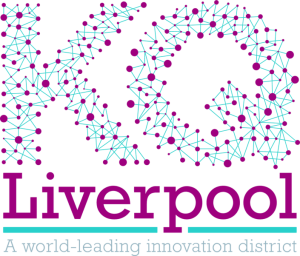A futuristic transport solution and a major new public space are at the heart of a visionary proposal to better connect Liverpool’s Knowledge Quarter (KQ Liverpool).
The new Spatial Masterplan and Transport Vision documents, which were unveiled to coincide with the MIPIM UK property convention in London earlier today, aim to stimulate new thinking and help fuse existing boundaries within KQ Liverpool, improve connections across the city centre and create a new public space at the epicentre of the city centre.
Among the series of urban design and transport ideas put forward in the vision is a new high-tech, eco-friendly transport system running up Brownlow Hill from the city centre, to the universities, hospitals and the Paddington Village development. With the working title of the ‘Lime Line’, it could significantly improve ‘last mile’ uphill journeys for patients, medical professionals, academics, students, staff and other visitors.
KQ Liverpool, the partnership organisation which runs the Knowledge Quarter, are calling for global innovation technology companies to collaborate with them on ideas for this new high frequency, short distance, 24-hour transit system.
The documents also reveal a shared vision for ‘Lime Square’, which would see a major overhaul of the crossroads adjacent to the Adelphi Hotel and former Lewis’s building (home to the new ‘Circus’ development), to create a dynamic conduit for all parts of the city and a gateway point that will feel “both world class and distinctly Liverpudlian”.
The Spatial Framework, devised on behalf of KQ Liverpool by K2 Architects and HOW Planning, outlines the need to blur the lines between the distinct communities and neighbourhoods of KQ Liverpool and maximise the area’s natural strengths to create a cohesive space and an exemplar destination for people to live, work & play.
The thrust of the Transport Vision, which has been created by Mott MacDonald, is “a transport environment that works for all”, with recommendations to improve walking and cycling routes in the area, together with the introduction of the ‘Lime Line’ and enhanced car parking facilities, in collaboration with Liverpool City Council and the Universities.
Speaking after this morning’s Knowledge Quarter event in London, as part of the MIPIM UK property and regeneration conference, Mayor Joe Anderson said:
“21st century Liverpool is a visionary city full of ambition and opportunity and we are excited to see such innovative ideas coming out of the Knowledge Quarter. As a Mayoral Development Zone, KQ Liverpool and the £1bn Paddington Village development are at the heart of the city’s growth, with world-leading research attracting investment and creating jobs which will come to define our future economy.”
Colin Sinclair, chief executive of KQ Liverpool, said: “Creating a world-class innovation district and making that space more accessible to everyone go hand in hand, which is why we have unveiled these two visionary frameworks simultaneously today.
“KQ Liverpool has made huge strides in the past year and we are confident that our world-leading strengths in fighting infection and disease, materials chemistry and high performance & cognitive computing; in education, health, science and technology, as well as our superb cultural assets including the Cathedrals, The Everyman and Liverpool Philharmonic on Hope Street, can help us to attract leading academics, doctors, scientists and innovators from across the globe.
“We are actively seeking innovators to come and collaborate with us on the detail of our vision and we are particularly excited about exploring new ideas with global technology companies, as we bid to deliver the world-leading tranport solution.”
Kevin Riley, project director at Mott MacDonald, said: “The Knowledge Quarter and the wider city region need a fully integrated, affordable and environmentally sound transport offering that sets us apart from other cities and makes it easier for businesses to choose us over our competitors. Liverpool needs to be a place that its even easier to get to and move around in, connected not only locally but also internationally by air and sea.
“The ‘Lime Line’ concept reflects the need for an affordable and sustainable solution that makes the Knowledge Quarter more accessible for everyone, regardless of their budget or physical ability, while a development such as Lime Square could become a dynamic open turnstile where people from all parts of the city are able to come together easily.”
“Once the new Royal and Clatterbridge hospitals open their doors, alongside the Rutherford Cancer Centre, RCP North building and Liverpool International College at Paddington Village, this need for transport innovation will come even more sharply into focus as the volumes of people flowing into and around the area continue to increase.
If it becomes a reality, the ‘Lime Line’ will connect right through from Edge Hill Station to Lime Street and Central Stations, with a potential second phase running to the waterfront, cruise terminal and conference and exhibition centres.
Mark Davies, architect director at K2, said: “Global cities don’t stand still. For us to maintain momentum, it’s crucial we move forward with a unified sense of place and an identity and aspiration that applies across the vibrant patchwork of individual districts, which naturally bleed into one other to create a coherent whole.
“Lime Square will connect the retail district with Knowledge Quarter Liverpool. It’ll become the new epicentre of the city.”
KQ Liverpool is a collaboration between the University of Liverpool, Liverpool John Moores University, Liverpool School of Tropical Medicine, Royal Liverpool and Broadgreen University Hospital Trust and Liverpool City Council. It is Liverpool’s largest Mayoral Development Zone, covering almost half of the city centre.
[av_post_meta]





